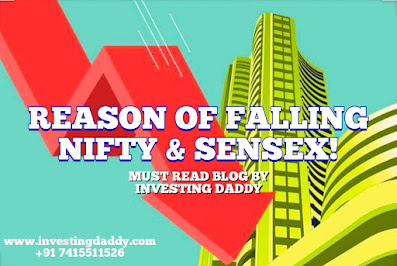Why is Indian Stock Market
Falling?
The
stock market has taken a beating for sixth day in a row. On Thursday, 24th
September 2020, #SENSEX fell 650 points while the #NIFTY slipped below 11,000. Several
factors have been responsible for the fall in #stock market. It came in the
wake of #Fed US Officials reiterating that the US economy was actually much
worse than the market pricing. Moreover, a reemergence of Corona Virus
(COVID-19) scare in European cities followed by lockdown restrictions, are some
of the main causes why the stock market has taken a plunge. We will go in
detail how each one of the causes has affected the stock market and what are
the future predictions.
2020 US Presidential Elections
This
year’s #Presidential elections in the United States are scheduled for Tuesday,
3rd November. History reveals that the market returns are
independent of which political party occupies the Oval Office, but still,
around 93% of investors believe that the US elections are going to impact their
returns.
A
second win for the republican candidate and current US President, #Donald Trump
is predicted as most of the Presidents in the past have been reelected unless,
they witnessed a recession. This probably explains why President #Trump has
been recently stressing on trade. Also, if Trump is reelected, it would be
favorable for the market.
On
the other hand, #democratic Presidential candidate #Joe Biden has announced the
reversal of 2017 tax cuts if he is elected to the oval office.
The
markets depend hugely on the US President’s ability to enact legislation.
Moreover, around the time of Presidential elections the stock market becomes a
little unpredictable and witness fluctuations.
$2 Trillion Scam by Global Big Banks
Financial
Crime Enforcement Network or #FinCEN has reported a global fraud including big
banks, to the tune of $ 2 Trillion. It is revealed that many big banks have
deliberately allowed fraudsters to rotate money even after they had a clue
about their suspicious activities.
#HSBC,
a British multinational investment bank and financial services holding company
has deliberately allowed the fraudsters to move millions of dollars even after
it was informed by the #US investigators about the suspicious nature of the
scheme.
Another,
American bank, #JP Morgan and Co. had allowed a company to move over $ 1
Billion through a London account, without even verifying, the owner of the
company. It is suspected that a gangster on the #FBI’s 10 most wanted list
might be the actual owner of the company.
Similarly,
#Deutsche Bank and #Standard Chartered allowed drug traffickers, terrorists and
mobsters to move money throughout the globe for illegal activities.
The
#SAR i.e. Suspicious Activities Report submitted by the #FinCEN also includes
44 Indian banks and over 2000 transaction amounting to $ 1 billion.
Some
of the major Indian banks found helping the fraudsters are – #Punjab National
Bank (290 transactions), #State Bank of India (102 transactions), #Bank of
Baroda (93 transactions), #Union Bank of India (99 transactions) and #Canara
Bank (190 transactions).
Immediately
after the scam was unearthed, stock prices of several banks involved, dipped
sharply, taking the stock market by a surprise.
London
Lockdown
New
#COVID-19 restrictions have been imposed in UK as the corona virus cases have
been increasing. The UK Prime Minister has spoken publically that they now seem
to be staring at the second wave of COVID-19 across the UK.
After
the lockdown was imposed, the #FTSE or the Financial Times Stock Exchange took
a straight plunge of £15billion.
Some
of the worst hit companies by the COVID-19 scare are #British Airways, down by
12%; #Mitchells & Butlers, one of the biggest pub and restaurant owners of
the UK saw a fall of steep 15%.
Continuing Indo-China Border Dispute
Since
mid June this year when 20 Indian soldiers have died in a brutal skirmish with
their Chinese counterparts, the tension between the neighbors has only been
escalating.
Experts
are also of the opinion that India’s border dispute with China will linger a
bit longer and wouldn’t be easy to resolve.
With
both sides imposing sanctions on each other it’s very likely that the trade
gets affected. Many pharmaceutical giants in India import raw chemicals from
China. The total Indian exports to China stands at $16.6 billion, while the
Chinese exports to India stands at $58 billion. The two are too deeply involved
in trade and any dispute is likely to impact the market negatively.
The
Indian stock market is emotionally driven and the predictably long dispute with
China has taken it for a dip.
*Kindly have advise from expert for portfolio balancing before including stock in your portfolio.
*Investment in securities market is subject to market risk.
* Mr. Vinay Prakash Tiwari is a SEBI Registered investment Advisor
Investing Daddy
+917415511526
+919628519650
Blog: https://investingdaddy.blogspot.com/2018/07/investing-daddy-investment-adviser-to.html
Youtube: https://www.youtube.com/investingdaddy
Facebook: https://www.facebook.com/investingdaddy
Website: www.investingdaddy.com



